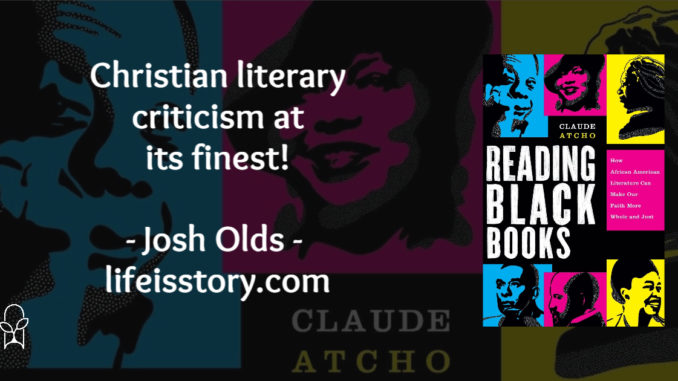
Published by Brazos Press on May 17, 2022
Genres: Non-Fiction
Buy on Amazon
Goodreads

Learning from Black voices means listening to more than snippets. It means attending to Black stories. READING BLACK BOOKS helps Christians hear and learn from enduring Black voices and stories as captured in classic African American literature.
Pastor and teacher Claude Atcho offers a theological approach to 10 seminal texts of 20th-century African American literature. Each chapter takes up a theological category for inquiry through a close literary reading and theological reflection on a primary literary text, from Ralph Ellison's INVISIBLE MAN and Richard Wright's NATIVE SON to Zora Neale Hurston's MOSES, MAN OF THE MOUNTAIN and James Baldwin's GO TELL IT ON THE MOUNTAIN. The book includes end-of-chapter discussion questions.
READING BLACK BOOKS helps readers of all backgrounds learn from the contours of Christian faith formed and forged by Black stories, and it spurs continued conversations about racial justice in the church. It demonstrates that reading about Black experience as shown in the literature of great African American writers can guide us toward sharper theological thinking and more faithful living.
I read a lot. Fiction. Non-fiction. Lifeisstory.com was started an outlet for that obsession for stories—real and imagined—and how they effect and change individuals and societies. As I’ve gotten older, I’ve become more cognizant of the fact my high school English and Literature classes were pretty much exclusively white. It’s only been recently that I’ve started to purposefully read fiction and non-fiction by Black authors. Even then, being white, I’ve often found myself missing some educational or cultural element. Claude Atcho’s Reading Black Books introduces readers to a selection of important Black American literature and provides in-depth discussion on them through the lens of faith and justice.
Reading Black Books is a masterpiece of literary and theological reflection. Even without diving into the specificities of the books or their authors, Atcho models how to read fiction theologically. His insight goes way beyond the superficial and cut to the heart of what these books and their authors are consciously and unconsciously saying about God, faith, and justice. Atcho is a current pastor who has, in the past, taught collegiate African American literature. Reading Black Books combines his two areas of expertise, making him uniquely qualified for this book.
Atcho covers ten different themes, as seen through the lens of ten different Black authors. Seven of the chapters cover novels; three focus on poetry:
- Image of God: Ralph Ellison’s Invisible Man
- Sin: Richard Wright’s Native Son
- God: James Baldwin’s Go Tell It on the Mountain
- Jesus: Countree Cullen’s “Christ Recrucified” and “The Black Christ”
- Salvation: Sora Neale Hurston’s Moses, Man of the Mountain
- Racism: Nella Larsen’s Passing
- Healing and Memory: Toni Morrison’s Beloved
- Lament: W.E.B. Du Bois’s “The Litany of Atlanta”
- Justice: Richard Wright’s The Man Who Lived Underground
- Hope: Margaret Walker’s “For My People”
Each chapter is 12-18 pages long, introducing the cultural context of the work before diving into its primary themes, images, metaphors, and messages. The chapters end with a contemporary reflection on what we do with what we’ve learned through the work.
The best way to read Reading Black Books would be to use it as a literature class, using Atcho’s reflections as a guide for reading through the actual source material.
One criticism of the book is that it assumes the reader already has a working knowledge of the books it is discussing. Even for readers who have read a book or are familiar with it, it can still be a bit discombobulating to be dropped right into the middle of a discussion about it. Taking a few extra pages and the beginning of each chapter to summarize the content about to be analyzed would have made Reading Black Books more accessible and drawn readers into the analysis more smoothly. Also, while there are discussion questions for each chapter, they are reserved for the end of the book. Stylistically, I think it would have been more helpful to have had those at the end of each chapter.
But the only place I can really criticize is structure. The quality of the content that is there is engaging, thoughtful, nuanced, and robust. Atcho’s love for each of the works discussed comes through his words as he cogently and passionately shares the Black experience as seen through these writers. Stories matter. Black stories matter. Reading Black Books is Christian literary criticism at its finest. This is a needed work and Atcho could easily pen several more volumes like this and I would read each one.
